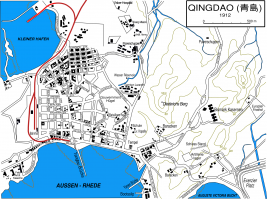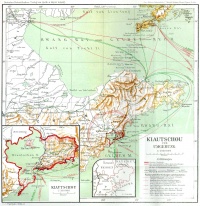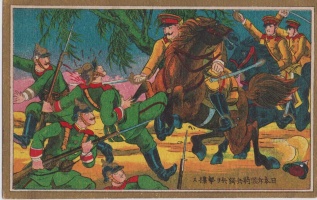The Japanese-German War (Nichidoku sensō)↑
When the Empire of Japan, an ally of Great Britain since 1902, decided to enter the First World War shortly after hostilities had broken out in Europe, the European conflict developed into a global war. On 15 August 1914, the Japanese government presented an ultimatum to Germany, demanding that the country disarm its military forces in East Asia and hand over the leased territory of Jiāozhōu (Kiautschou) in China. The question of whether Japan should enter the war — and why — was the subject of controversy in Japan. The expansion of Japanese influence in China and the Pacific was the main motivation behind Japan’s decision to enter the war.
Germany chose to ignore the ultimatum, leading to a declaration of war by Japan on 23 August. The German government hoped that the garrison would be able to hold out until the war in Europe was won. In his instructions to Admiral Alfred Meyer-Waldeck (1864-1928), the governor of the leased territory, Wilhelm II, German Emperor (1859-1941) declared that he would rather hand over Berlin to the Russians than Jiāozhōu to the Japanese – an example of the Kaiser’s racist attitudes, the basis of his perception of Japan as the “Yellow Peril.” However, the combined Japanese and British forces, numbering almost 50,000 men, overwhelmed the German garrison, which surrendered on 7 November 1914. In October 1914, the Japanese navy also occupied German-controlled Micronesia.
Though enthusiasm for the war was limited in Japan, this military triumph over yet another great power, following the victories against China in 1895 and Russia in 1905, was celebrated in the mass media. The short war with Germany came to be officially known as the “Japanese-German War” (Nichidoku sensō). Commemorative postcards, lithographs, and pictorials celebrated the “Fall of Qingdao.”
The “German Peril” and the Siberian Intervention↑
Following the German surrender of Qingdao, Japan continued to contribute to the military efforts of the Entente powers by deploying naval forces in the Indian Ocean, the Pacific and the Mediterranean. But the only other significant military engagement in which Japanese ground forces were involved was the Siberian Intervention, which began in the last year of the war.
Apart from Japanese economic interests in the region and security considerations, the perception of a “German Peril” — the prospect of German forces advancing into Siberia to threaten the Japanese Empire directly — was raised by those favoring the dispatch of larger troop contingents to the Russian Far East. The idea was even taken up by major Western news outlets such as The Washington Post.[1]
Japanese views of Germany during the “Great War”↑
Although Japan and Germany stood on opposite sides in the Great War, opinion about Germany was divided in Japanese politics, society, and media. Some condemned German belligerence and militarism, following the lead of French and British wartime propaganda, while others admired Germany’s resilience in the face of the superior might of the Allies and identified Germany as a model for the post-war age.
Critics of Germany pointed particularly to its conduct in Belgium. German actions were frequently described in the media as “bestial” and “in violation of international law.” The daily Yomiuri Shinbun held “German militarism” responsible for the “breach of international rights, for offenses against humanity and for the slide back into the age of barbarism.”[2] In a 1915 contribution to The Washington Post, Prime Minister Ōkuma Shigenobu (1838-1922) described Germany in scathing language as a “great murderer,” the “destroyer of peace, of humanity, of industry, of agriculture, of navigation.”[3]
Other observers, however, continued to regard Germany as a potential model for the future. In particular, the Imperial Japanese Army (IJA), which had been strongly pro-German since the 1880s, showed a marked interest in Germany’s ability to mobilise national resources for the war. Even the Imperial Japanese Navy (IJN), in a 1917 study “On the German National Character,” praised the positive aspects of German militarism (gunkokushugi), which it acknowledged as the main reason for Germany’s ability to defend itself against far more powerful enemies. Non-military commentators joined the chorus. Even after the war, journalist Nagasaki Takeshi continued to espouse the view that militarism had been indispensable for the survival of the nation. Germany, he argued, had been saved by militarism, not destroyed by it. The “fact that Germany (…) still exists is the result of German militarism.”[4] Another journalist, Chikushi Jirō, in an article entitled “Advocating for Good Militarism,” equated militarism with nationalism, emphasizing that despite Germany’s defeat, a positive view of militarism needed to be nurtured as a basis for the future establishment of national unity.[5]
While some writers, including Ōkuma, advocated a “harmonization of Eastern and Western civilizations,”[6] discourses of Japanese global superiority also emerged forcefully during the war. For example, the 1915 study “Competition between Western and Eastern Spirits: Yamato Spirit and German Spirit,” contrasts the exemplary manner in which Japanese troops had fought the battle of Qingdao, applying the ethos of bushidō (the way of the warrior), with Germany’s “brutal, inhumane, and unjust” conduct in Belgium and elsewhere. Characterizing Germany’s behavior as “barbaric”, the study establishes Japan as a morally superior nation. For the author, Japan’s superiority is defined with its “incomparable” and “sacred” kokutai — the “unique unity between the unbroken imperial dynasty and its subjects.”[7] This celebration of Japanese pre-eminence was also frequently found during and after the war in other journals, including the journal of the army officer corps, the Kaikōsha Kiji.
Sven Saaler, Sophia University
Section Editors: Jan Schmidt; Sōchi Naraoka
Notes
- ↑ “Hun Peril in Eastern Russia Justifies Japan in Forestalling Control by Enemy,” The Washington Post, 10 March 1918, p. ES1.
- ↑ Yomiuri Shinbun, 22 June 1916, p. 3.
- ↑ Okuma, Shigenobu: Japanese Premier Declares Kaiser Is Greatest Enemy of Civilization. The Washington Post, 17 May 1915, p. 5.
- ↑ Nagasaki, Takeshi: Shakaishugi to Gunkokushugi [Socialism and militarism], in: Ajia Jiron 4/4 (1920), pp. 38-45.
- ↑ Chikushi, Jirō: Yoki gunkokushugi no teishō [Advocating good militarism], in: Ajia Jiron 4/10 (1920), pp. 48-56.
- ↑ Okuma, Shigenobu: Tōzai bunmei no chōwa. Tokyo 1922.
- ↑ Tōzai Hikaku Kenkyū Gakkai (ed.): Tōzai konkyō. Yamato-damashii to Doitsu-damashii, Tokyo 1915.
Selected Bibliography
- Burdick, Charles Burton: The Japanese siege of Tsingtau. World War I in Asia, Hamden 1976: Archon Books.
- Dunscomb, Paul: Japan's Siberian intervention, 1918-1922. A great disobedience against the people, Lanham 2011: Lexington Books.
- Nish, Ian H.: Alliance in decline. A study in Anglo-Japanese relations, 1908-23, Basingstoke 2002: Palgrave Macmillan.
- Saaler, Sven: The Imperial Japanese Army and Germany, in: Spang, Christian W. / Wippich, Rolf-Harald (eds.): Japanese-German relations, 1895-1945. War, diplomacy and public opinion, London 2006: Routledge, pp. 21-39.
- Saaler, Sven: Zwischen Demokratie und Militarismus. Die Kaiserlich-Japanische Armee in der Politik der Taishô-Zeit (1912-1926), Bonn 2000: Bier'sche Verlagsanstalt.













